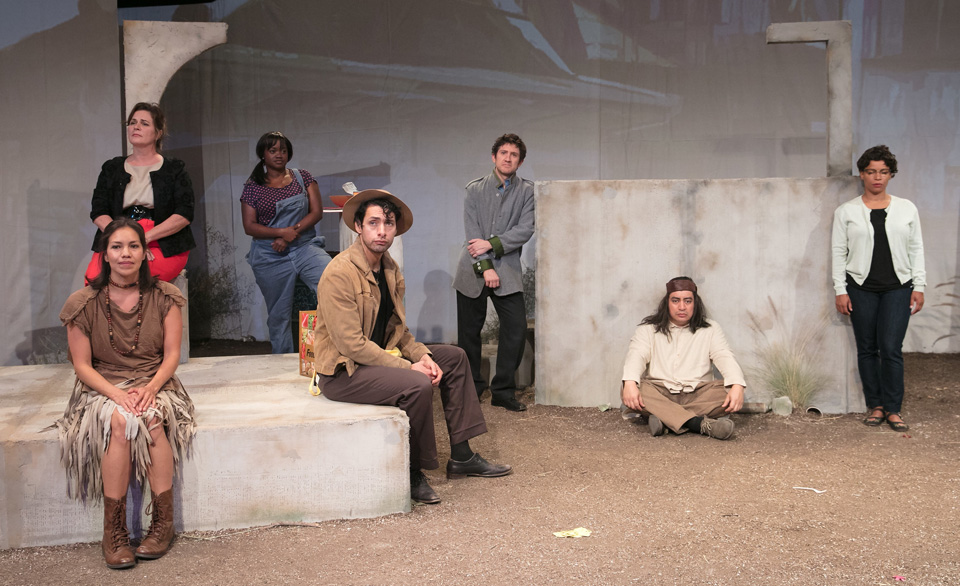
LOS ANGELES—Company of Angels, founded in 1959 by a group of television and film actors that included Richard Chamberlain, Leonard Nimoy and Vic Morrow, claims to be the oldest professional theater in Los Angeles. Today its mission is to provide a space for the voices and audiences neglected by the major regional theaters.
The company’s world debut production of This Land, by Mexican-American playwright Evangeline Ordaz, juggles the intricately interconnected histories of several families in the Watts community of Los Angeles. Long known as the location of Simon Rodia’s world-renowned Watts Towers, and for the painful rebellion of 1965, Watts may have just acquired a new claim to fame: the setting for this play.
It’s fitting that a theater company with such deep roots in L.A. should take on a project like this. Passions, dreams, illusions, contentments, contest and strife, all play out their stories on this small residential street that was once the land of the indigenous Tongva people. Successive waves of migrants and settlers originating in many different parts of the world come to de- and re-populate this little acre as their home. The two-act, two-hour theater piece spins like a roulette wheel, landing each time on a different time period with its contemporary cast of contestants, their grievances and their attempts at co-existence.
The general arc is familiar by now: Indigenous peoples supplanted by the Spaniards, with their oppressive missions, cattle, fences and irrigation; Americans overtaking the later Mexicans—the Americans themselves a mixed bunch of whites, Blacks and Irish; African Americans fleeing the Jim Crow South for jobs and a somewhat less violent form of racism; the newer immigrants from Mexico and elsewhere in Latin America; and now who are these pale faces coming in?
Trying to figure out the generational and inter-racial relationships among these families over an almost 200-year span keeps an audience member’s mind constantly working. It’s like deciphering a complex Chinese puzzle—although perhaps that’s not the most apt analogy because the Chinese (and other immigrants from Asia) are about the only ethnic groups not included in this time-bending portrait of Watts. Much credit goes to the company’s artistic director, Armando Molina, who directs this skillful seven-actor cast playing more than twice that many roles.
Aside from the ethnic identities of the procession of occupants of the land, Ordaz also includes some of the economic and personal reasons people migrate—the new jobs and professions that open up, the new potential for personal growth and enrichment, the unanticipated attraction to other people and cultures, the romance and freedom associated with the West Coast.
In this place where there was once no such thing or even a concept of “ownership” of land, nor water, nor sky, new legalisms allow land grabs, formal deeds to plots and houses, real estate developers the leverage to profit from racialization and gentrification, and the right to tear down houses and erect shopping malls. From collective management of the earth’s resources to royal land grants, to private family homes, to ownership of lucrative commercial property.
Taking a myriad of small stories and making their larger impact visible, the playwright paints a wide canvas of time on a few square feet. “Is gentrification just another form of manifest destiny?” comments director Armando Molina.
The actors are all top-notch, six of them Actors’ Equity members. Among the men, Richard Azurdia stood out as Fidel, a recent Mexican immigrant whose start-up taco business becomes a huge success in what was once an almost all African-American part of town, and as Tomás, the Tongva village chief who has submitted himself to the slavery-like conditions at the Spanish mission. I saw him not long ago in My Mañana Comes to impressive effect, also directed by Molina. Ian Alda plays several avatars of the Irish Dalton family which a few generations on will give him a Jewish father; he is palpably oily as Dalton Hill (shortened from Hilman), the entitled real estate sharpie planning to bring upscale yoga studios into a revitalized Watts for “the new people.” Jeff Torres plays Enrique, the lovesick Spanish land-grant ranchero attracted to the headstrong Toya, Tomás’ daughter, and in modern times Ricardo, a modest homeowner who’s the last holdout against gentrification on the block.
Among the women, who in general performed more fiery, expressive roles, Cheryl Umaña plays Toya with consummate energy and fury, later coming back briefly as Della, an interracial (Black and Latino) neighbor. LeShay Tomlinson lights up the stage as Leola Piqueray (call her Mrs. Piqueray, if you please), whose family goes back to slavery times on a Bastrop, Louisiana, plantation. She comes to L.A. to work at Douglas Aircraft, hoping to escape the vicious race climate of the South, not realizing how much of that has also migrated to sunny Southern California. “Here the law already changed and things are still bad,” she says. With equal élan Tomlinson plays Leola’s granddaughter Sharon.
Niketa Calame portrays Leslie, Leola’s daughter, once a SNCC activist and later fallen on hard times once the jobs disappeared, and Leola’s warm-hearted granddaughter Mel, who winds up romantically with Fidel. Calame also portrays Pepe, a former slave who became a mission guard in California. Finally, Johanna McKay portrays the gentle Maeve Hilman, whose background is mixed Okie and Irish. She is the positive Anglo figure who wants to do right by her neighbors and is among the last to surrender to white flight—and then only at her son’s demand. After all, not every whitey is a monster.
Part of the pleasure is watching the actors’ agility in switching rapidly back and forth between the characters they play, and seeing a lovingly prepared dish handed off between time frames.
In fact, the theme of food is highly developed, as tastes and recipes travel through time and space: One minute we’re savoring Tongva dishes of mashed acorn and cactus pear, the next a famous pork roast with Louisiana origins, now transformed into Mexican carnitas for tacos. Ordaz reminds us that few foods are the exclusive property of only one people.
“Gentrification threatens to destroy history, culture, and the social networks that low-income people set up so they can survive,” Ordaz told Latin Heat writer Cris Franco. “Writing this play helped me to see that this issue of displacement is something we have seen before in history.”
This Land covers a lot of ground while staying in the same place. “This land” is actually the protagonist, the characters who inhabit it merely bit players in short segments of L.A. history. As such, the script is almost all exposition for its archetypal figures, with little time or space for character development. Although the issues are laid out masterfully and intriguingly, I longed for the hyperactive stage to stand still for a moment or two and allow each character half a minute to voice a poetic address to his or her unique personal and historical predicament.
The title of course brings to mind Woody Guthrie’s most famous song, and although we do not hear it, indeed Ordaz is saying that “this land belongs to you and me.”
Ordaz has also said that “time is one of my characters…. New events mirror events of the past, and we sense this all in our everyday lives.” Intercultural mixing took place then and continues today. “Maybe there is in fact already a whole new ethnicity of racially and culturally mixed peoples—Angeleños!”
Scenic and lighting design on a single unit, multi-level set are by Justine Huen, with costume design by Manee Leija.
Performances of This Land take place through Nov. 13 on Fri. at 8 pm, Sat. at 8 pm, Sun. at 7 pm, and Mon. at 8 p.m at Company of Angels, 1350 San Pablo Street, Los Angeles 90033. Mon. performances are pay-what-you-can. For tickets and other information go to www.companyofangels.org. Free parking in lot and ample street parking.

MOST POPULAR TODAY

After months of denial, U.S. admits to running Ukraine biolabs

“Trail of Tears Walk” commemorates Native Americans’ forced removal

‘Warning! This product supports genocide’: Michigan group aims to educate consumers

Ohio: Franklin County treasurer attends Netanyahu meeting, steps up Israel Bond purchases

Hold the communism, please: SFMOMA’s Diego Rivera exhibit downplays artist’s radical politics






Comments